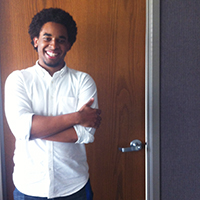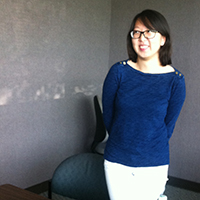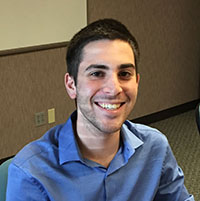During his senior year, David Dwight, a 2015 graduate of the School of Engineering & Applied Science at Washington University in St. Louis, led student actions protesting the shooting death of Michael Brown. Today, he continues his activism by serving as an intern for the Ferguson Commission, the governor-appointed group of 16 community leaders charged with investigating ways to address the region’s gaping disparities. He joins Washington University students Heidi Chiu and Zachary Panter, both of whom will be seniors in Arts & Sciences this fall.
The students have attended meetings, collected research, interviewed residents and currently are assisting the commission to write its report outlining its recommendations to improve education, municipal courts and governments, economic opportunities and the relationship between residents and law enforcement.
Washington University provided the Ferguson Commission with the interns as well as office space on North Campus. That’s where the students met to discuss their experiences serving the commission and how it will affect their futures.

David Dwight, Class of 2015
Degree: Biomedical engineering
Hometown: New Hope, Pa.
On the research: It has been amazing for us to immerse ourselves in all of this research and synthesize it. But a lot of this research and data has existed before. It came up before in St. Louis and in Los Angeles after the Rodney King riots and, before that, in 1965 with the McCone Commission. That’s why the next step — the implementation — is so important. We shouldn’t be having this exact conversation again in 15 years.
On joining the establishment: Was I concerned? Yes. As an activist, you should be questioning authority to make sure it’s following through on its principles. But once I came onto staff, that first week — if not the first day — I was confident in the staff and the commission’s commitment to make sure its ideas are implemented through community partnerships.
On employing his engineering skills: The analytical skills that I developed in the engineering school really helped me here. Engineering is going through a paradigm shift in terms of not only valuing technical knowledge, but also realizing that in today’s globalized world, engineers have an opportunity to impact society and see the human component.

Heidi Chiu, senior
Major: International and area studies
Hometown: Queens, N.Y.
On applying to the internship: I wanted to see how institutions would respond to failures that social movements were challenging. It’s been interesting to see the commission connect the visions that different groups have and pull them together to create a regional vision. I’ve realized how complex the issues are, but that people also work in their own silos. There’s not a connection and collective impact among all of these different groups of people who are valued for their specializations rather than the ability to connect them.
On attending meetings: We were encouraged to go to as many meetings as possible. There was a meeting about community health, trauma and toxic stress. The room — about 80 to 90 people — was asked to respond if racism caused toxic stress and trauma in our community. Everyone said yes.
On lessons to share: Listen to directly impacted people and assume mutual learning will always occur. Don’t take on a patronizing role, no matter the degrees or credentials you have accumulated. I also would urge students to learn about the commission’s priorities and track their progress. And if there is no progress, take part in a movement and demand change.

Zachary Panter, senior
Major: Latin American studies with minors in Spanish and legal studies
Hometown: Miami
On encountering the region’s disparity: I was not involved in activism like Heidi and David. Then I came here and started getting the facts and talking to people. That made it real for me. Right now, I’m looking at quotes from a meeting where people were talking about the fear they feel constantly — “I am scared of my neighborhood,” “I’m scared to go to the park,” “I know so many people who have been shot and I’m afraid it’s going to be me next or my kids.” That is powerful. That is real.
On his favorite project: As the civic engagement intern, I got to be involved in our Art Speaks Youth Summit where kids 13-19 got to express their feelings and hopes for the region through art, theater, music and poetry. They created remarkable, lasting pieces that were really impactful. Meeting them and other people across the region has really influenced me.
On how the university can support the commission: I work really closely with the First Year Center, and we have programming that talks about diversity, but I would like to see students take a class and learn about these issues. As a WUSA (Washington University Senior Associate), I did diversity training, and that was my first entry to talking about these things. A lot of students come here and they don’t have bad intentions, but they haven’t had to deal with these issues. But being able to understand your role in society is an important life skill to learn.